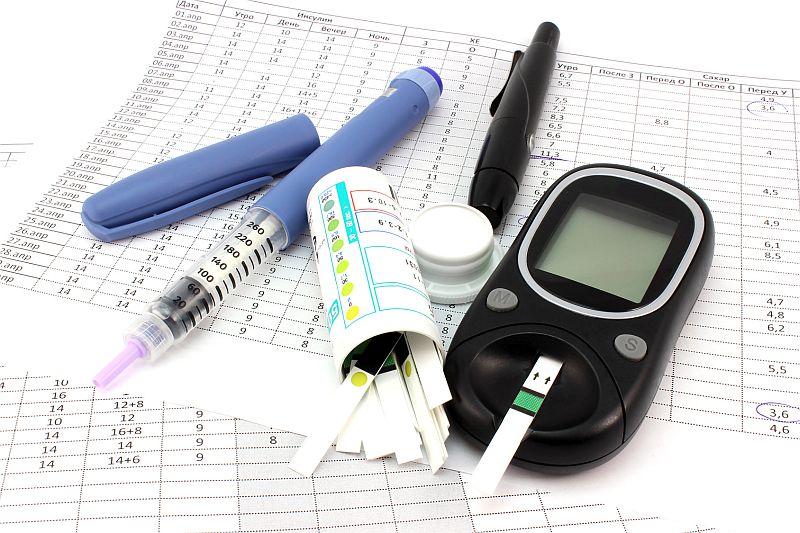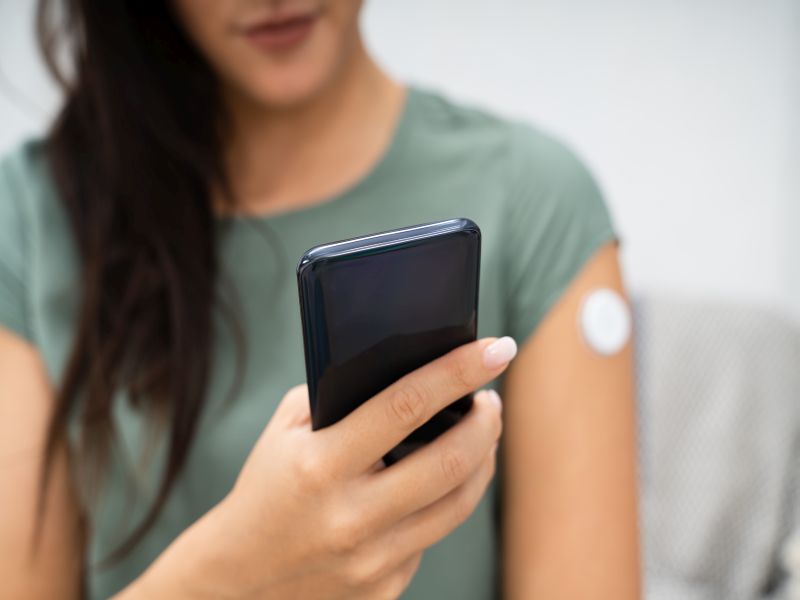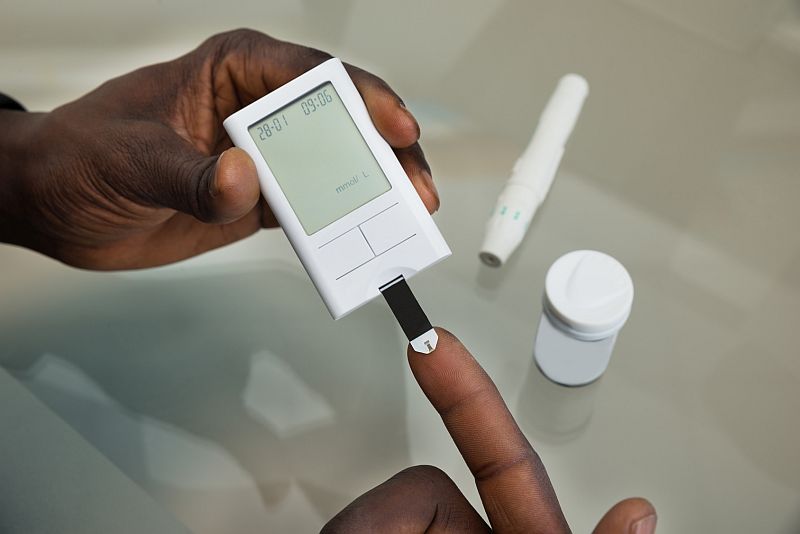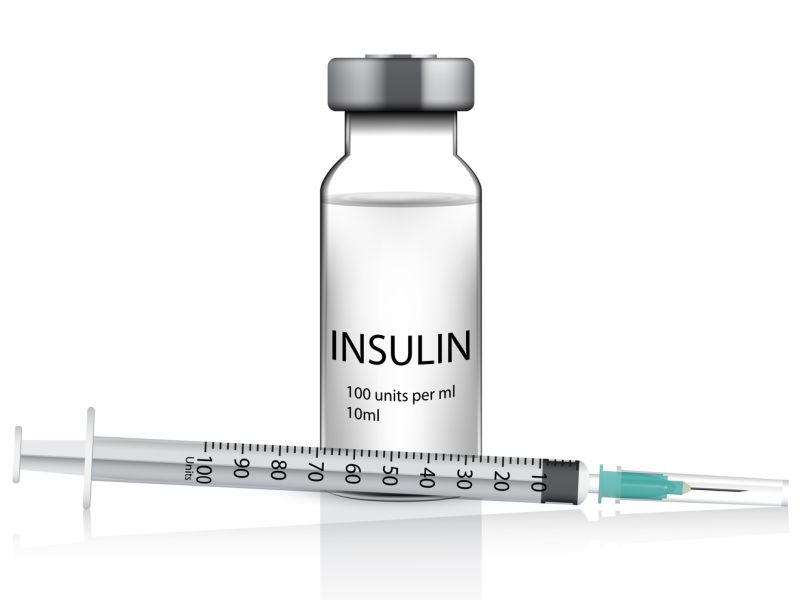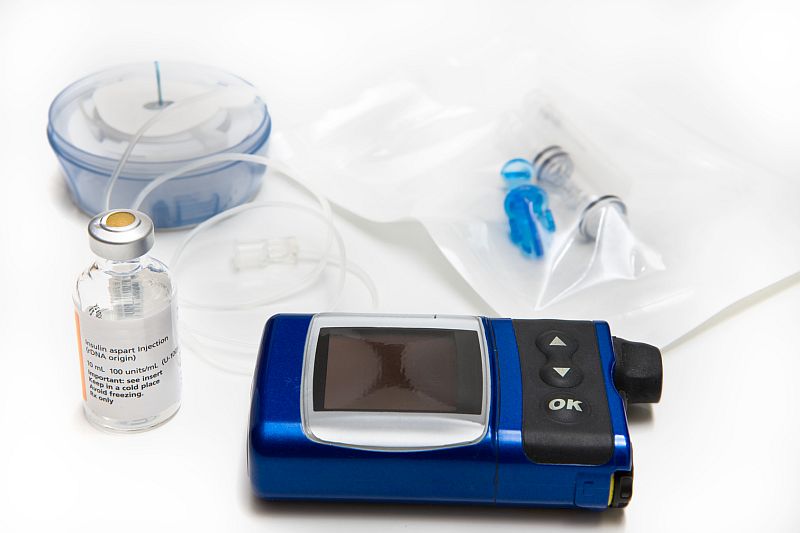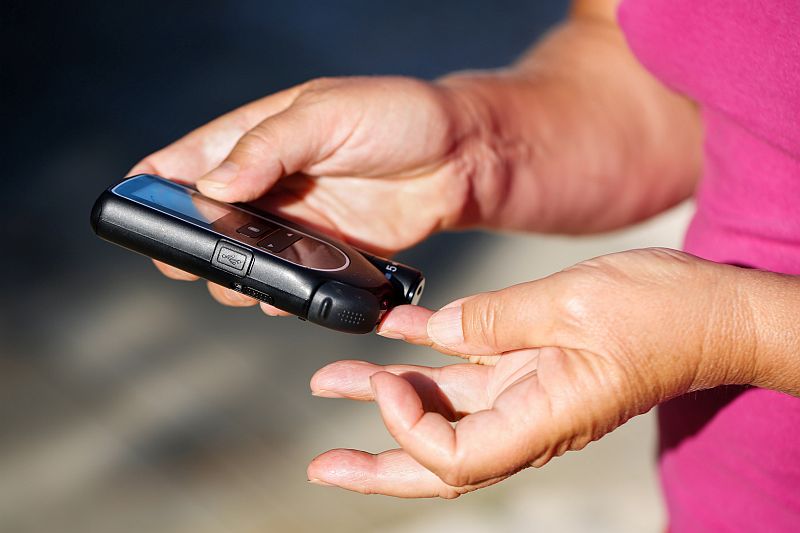Get Healthy!
108 Results for search "Diabetes: Type I".
Health News Results - 108
Black people have higher diabetes death rates than white people in the 30 largest cities in the United States, a new study finds.
But placing a cap on the price of insulin could narrow that racial gap, according to researcher Joanna Buscemi, of DePaul University in Chicago. Insulin medication is needed by all people with type 1 diabetes and many who have type 2, the more common form of th...
- Robert Preidt
- |
- March 30, 2021
- |
- Full Page
Blood sugar levels in youngsters with type 1 diabetes improved during Britain's first national COVID-19 pandemic lockdown, researchers say.
"Children and families found it easier to manage this disease when they were forced to stay at home. This helps us to understand the pressure that is put on patients and families when trying to live normal busy lives with activities outside of the hom...
- Robert Preidt
- |
- March 23, 2021
- |
- Full Page
Poorly controlled type 1 diabetes significantly increases a child's risk of COVID-19 complications and death, researchers warn.
The risk of complications is 10 times higher in youngsters with poorly controlled type 1 diabetes than in those with well-controlled diabetes, according to a study presented Saturday at a virtual meeting of The Endocrine Society.
"This study shows keeping d...
- Robert Preidt
- |
- March 22, 2021
- |
- Full Page
Black Americans who live in rural areas are two to three times more likely to die from diabetes and high blood pressure compared with white rural folks, and this gap hasn't changed much over the last 20 years, new research shows.
The study spanned from 1999 through 2018, and will be published as a research letter in the March 23 issue of the Journal of the American College of Cardiolo...
- Denise Mann
- |
- March 15, 2021
- |
- Full Page
Just two weeks of treatment with an experimental drug can delay the onset of type 1 diabetes by several years, researchers report.
The drug, called teplizumab, is already under review by the U.S. Food and Drug Administration based on earlier evidence of its effectiveness.
If it gets the green light, it would become the first drug approved for delaying type 1 diabetes in high-risk pe...
- Amy Norton HealthDay Reporter
- |
- March 8, 2021
- |
- Full Page
Women with type 1 diabetes may have a shorter length of time to conceive and bear children compared to those without the disease, new research suggests.
The hormone insulin plays an important part in regulating female reproductive function, and people with type 1 diabetes don't make enough insulin on their own. But little was known about how type 1 diabetes affects the start of menopause,...
- Robert Preidt
- |
- March 4, 2021
- |
- Full Page
Diabetes is never an easy disease to manage, but coping with type 1 diabetes can be a particularly difficult challenge for teens.
The transition from childhood to adolescence can be hard on both kids and parents, the JDRF (formerly the Juvenile Diabetes Research Foundation) says.
As boys and girls with type 1 diabetes enter puberty they undergo lots of changes, including increases i...
- |
- February 20, 2021
- |
- Full Page
Diabetes is a big risk factor for a severe bout of COVID-19, and a new European study bears that out: It finds that 1 in every 5 hospitalized COVID-19 patients with diabetes die within 28 days of admission.
One U.S. expert wasn't surprised by that grim finding.
"Diabetic patients are clearly in a very high-risk category and should be among the first groups of people to get the vacc...
- Ernie Mundell and Robert Preidt HealthDay Reporters
- |
- February 18, 2021
- |
- Full Page
Developing diabetes during pregnancy may increase a woman's risk for heart disease later in life, according to a new study.
It included about 1,100 women without type 1 or type 2 diabetes. Those who developed diabetes during pregnancy (gestational diabetes) were twice as likely by mid-life (average age: 48) to have calcium in their arteries, a strong predictor of heart disease.
This...
- Robert Preidt
- |
- February 8, 2021
- |
- Full Page
Researchers report that insulin can be stored at less-cold temperatures than previously known, potentially simplifying diabetes care for people in warmer regions that have fewer resources.
Researchers from Doctors Without Borders and the University of Geneva tested insulin storage in real conditions ranging from 77 to 98.6 degrees Fahrenheit for four weeks -- the time it typically takes t...
- Cara Murez
- |
- February 4, 2021
- |
- Full Page
Kids with diabetes can lead full, fun lives, but they have special needs. Here's what parents should know.
Diabetes is common among American children. More than 205,000 kids and teens have the disease, and cases are rising.
Age makes a difference in the type of diabetes a child is likely to have.
"Most children younger than age 10 with diabetes have type 1," said Dr. Santhosh ...
- Steven Reinberg
- |
- January 20, 2021
- |
- Full Page
The coronavirus pandemic has highlighted health care disparities in the United States, but a new study puts that issue into sharper focus, finding that Black and Hispanic people with type 1 diabetes who get COVID-19 are much more likely to have serious complications or die.
The study found that Black people with type 1 diabetes and COVID-19 were nearly four times more likely to be hospita...
- Cara Murez
- |
- January 8, 2021
- |
- Full Page
After starting a drug that's officially approved to treat a type of blood cancer, a young man with type 1 diabetes was able to stop using insulin.
He's been off insulin since August 2018 -- more than two years.
Dr. Lisa Forbes -- his doctor and co-author of a letter describing his case in the Oct. 8 issue of the New England Journal of Medicine -- stopped short of calling ...
- HealthDay News
- |
- December 17, 2020
- |
- Full Page
Repeat this: The key to helping people with diabetes stay healthier and out of the hospital could be as simple as better communication.
And an underutilized technique called "teach-back" may make a big difference for type 1 and type 2 diabetes patients, a new study finds.
It's a simple concept: After a health care provider explains various details on treatment plans, medications a...
- Cara Murez
- |
- November 30, 2020
- |
- Full Page
Scientists knew that dangerous T-cells lived in the pancreases of people with type 1 diabetes, but a new study shows they also take up residence in the pancreases of healthy individuals.
Researchers from the La Jolla Institute for Immunology in California used a new staining technique to show where these cells had gathered in human tissue samples. They were surprised that even tissue ...
- Cara Roberts Murez
- |
- October 21, 2020
- |
- Full Page
After starting a drug that's officially approved to treat a type of blood cancer, a young man with type 1 diabetes was able to stop using insulin.
He's been off insulin since August 2018 -- more than two years.
Dr. Lisa Forbes -- his doctor and co-author of a letter describing his case in the Oct. 8 issue of the New England Journal of Medicine -- stopped short of cal...
- Serena Gordon
- |
- October 8, 2020
- |
- Full Page
When the COVID-19 pandemic began, many doctors started providing care via telemedicine. Now, a new survey of people with type 1 diabetes suggests many like remote care and hope it continues in the future.
Among the survey respondents who had a telemedicine visit during the pandemic, 86% found the remote appointments useful, and 75% said they planned on having remote appointme...
- Serena Gordon
- |
- October 6, 2020
- |
- Full Page
Delivering by cesarean section deprives babies from receiving mom's beneficial bacteria during the journey through the birth canal. Now researchers are studying an innovative way to counter that: Feeding newborns breast milk fortified with their mother's poop.
There is, indeed, a yuck factor, the scientists acknowledge. But they also stress that the tactic, still under study, is done ...
- Amy Norton
- |
- October 1, 2020
- |
- Full Page
A COVID-19 infection can cause a lot of serious, sometimes lingering health problems, like lung damage, kidney damage and ongoing heart issues. Lately, research has suggested it may also cause the sudden onset of insulin-dependent diabetes.
A new report details the case of a 19-year-old German with asymptomatic COVID-19 infection who ended up hospitalized with a new case of insulin...
- Serena Gordon
- |
- September 3, 2020
- |
- Full Page
Parents worry that COVID-19 can make a diabetic child's condition worse, but an expert has some tips for keeping kids healthy during the pandemic.
"If a child has good control of their diabetes, it does not seem as though there will be severe effects if they were to get the virus," said Dr. Michael Yafi, an associate professor of pediatric endocrinology at McGovern Medical School at ...
- Steven Reinberg
- |
- August 31, 2020
- |
- Full Page
An artificial pancreas system is safe and effective at managing blood sugar levels in kids as young as age 6 with type 1 diabetes, according to a new study.
The system uses a continuous glucose monitor (CGM) to track blood sugar levels and automatically delivers insulin when needed using an insulin pump. It replaces reliance on fingerstick or CGM with delivery of insulin by injection ...
- Robert Preidt
- |
- August 28, 2020
- |
- Full Page
Diabetes can wreak havoc on many parts of the body, including the eyes, but people with diabetes aren't doomed to have vision problems.
With good blood sugar management and regular eye exams, many eye conditions can be prevented or treated, experts say.
Patricia Welter, a Pilates studio owner from Palm Harbor, Fla., wishes she'd known more about preventing eye problems rel...
- Serena Gordon
- |
- August 10, 2020
- |
- Full Page
If you have diabetes and live in rural America, the closest specialist may be hours away. But new research shows that effective help may be as close as your phone.
The study found that a six-month telehealth program led to a significant drop in blood sugar levels. Participants had an average A1C level of 9.25% at the study's start and an average of 7.89% at the end. That bene...
- Serena Gordon
- |
- June 19, 2020
- |
- Full Page
Technology often makes life easier to manage, and new research confirms that's definitely the case for people with type 1 diabetes.
Continuous glucose monitors -- devices that approximate blood sugar levels every few minutes -- can help teens and young adults better manage their diabetes. They can also help older adults prevent dangerously low blood sugar levels (hypoglycemia), accor...
- Serena Gordon
- |
- June 17, 2020
- |
- Full Page
Out-of-pocket costs for Americans with type 1 diabetes average $2,500 a year, a new study says.
But 8% of patients have more than $5,000 in out-of-pocket costs, possibly due to having high-deductible health insurance plans or significant medical needs, researchers found.
And insulin accounted for only 18% of total out-of-pocket spending. The rest of it included cost ...
- Robert Preidt
- |
- June 2, 2020
- |
- Full Page
Ten percent of COVID-19 patients with diabetes die within a week of entering the hospital and 20% need a ventilator to breathe by that point, a new French study found.
Researchers analyzed data on more than 1,300 COVID-19 patients with diabetes, average age 70, who were hospitalized in France during March. Of those, 89% had type 2 diabetes, 3% had type 1, and the rest had...
- Robert Preidt
- |
- May 29, 2020
- |
- Full Page
An Australian study has good news for people with type 2 diabetes -- fewer people with diabetes are having heart attacks and strokes compared to 20 years ago.
Heart attacks, strokes and other cardiovascular complications have declined in the general population, too. But the decreases among people with diabetes have outpaced those for the general population, the researchers said.
...- Serena Gordon
- |
- May 1, 2020
- |
- Full Page
If you or someone you love has diabetes, you've probably noticed that diabetes always pops up on lists of people at higher risk from COVID-19 infections. And you've probably wondered why.
The good news is that people with diabetes -- any type -- don't seem to have a greater risk of catching the virus. The bad news is if you do get it and you have diabetes, you have higher odds of hav...
- Serena Gordon
- |
- April 13, 2020
- |
- Full Page
If you or your child has type 1 diabetes, you already have a lot of extra health worries, and now you need to add COVID-19 infections to the list.
You may be wondering if you have a higher risk of catching COVID-19, if you'll be able to get your diabetes supplies and how you might handle the illness if you do get sick.
Here's some information to help you get through this t...
- Serena Gordon
- |
- April 9, 2020
- |
- Full Page
Type 1 diabetes is a challenging, time-intensive disease that often strikes children, and new research suggests that strong family support helps improve the well-being of young adults with the condition.
The study found that young adults (under 30) with type 1 diabetes were more likely to be "flourishing" if they had good family connections. Flourishing was defined in the study as h...
- Serena Gordon
- |
- April 8, 2020
- |
- Full Page
Maybe you've gone to Craigslist to find a used car or a secondhand couch, but imagine having to turn to the internet to pay for lifesaving drugs.
It's already happening: A new study found that hundreds of ads were placed on Craigslist for insulin and asthma inhalers during a 12-day period in June 2019.
"This study shines a light on how deeply some patients are struggling to...
- Serena Gordon
- |
- February 18, 2020
- |
- Full Page
Diabetes among U.S. youths continued to rise from 2002 to 2015, especially for Asian children and teens, a new study says.
Researchers analyzed type 1 and type 2 diabetes among 5- to 19-year-olds. They found rates were generally higher in blacks and Hispanics than in whites. Surprisingly, the rate in Asian/Pacific Islanders rose faster than in all other racial ethnic groups.
- Robert Preidt
- |
- February 13, 2020
- |
- Full Page
A new artificial pancreas system, drugs that help control blood sugar and protect the heart and the kidneys, a new medication that delays type 1 diabetes, and a new way to track blood sugar throughout the day -- 2019 was a pretty big year in diabetes care.
"This has been a good year for patients who have diabetes. There have been a lot of changes and there are more options. The...
- Serena Gordon
- |
- December 31, 2019
- |
- Full Page
Living with diabetes -- especially if you need insulin to survive -- is a never-ending job that can be life-threatening if done wrong. That constant daily stress can lead to "diabetes burnout," a new study says.
Diabetics experiencing burnout are mentally and physically exhausted, feeling detached from their condition and apathetic about their need for self-care. Diabetes burnout can...
- Serena Gordon
- |
- December 10, 2019
- |
- Full Page
Skyrocketing prices and insurance limits are driving many people with diabetes to seek medications and supplies from an underground supply chain, a new study found.
"The cost of insulin, which is required in type 1 diabetes and a subset of type 2 diabetes, has increased substantially over the last decade. As the price of insulin rises and insurance premiums and deductibles go up, too...
- Serena Gordon
- |
- December 9, 2019
- |
- Full Page
People with inflammatory bowel disease, type 1 diabetes or blood clots may be at increased risk for rheumatoid arthritis -- and people with rheumatoid arthritis are at added risk for heart disease, blood clots and sleep apnea, researchers say.
Their findings could improve understanding of how rheumatoid arthritis (RA) develops and also lead to earlier detection and screening for other...
- Robert Preidt
- |
- November 20, 2019
- |
- Full Page
While the high price of insulin has gotten a lot of attention lately, it's not the only cost issue facing people with diabetes. New technologies designed to improve blood sugar management often cost too much for people to afford.
Maya Headley, 36, has had type 1 diabetes for 30 years. The New York City resident had been using an insulin pump to deliver the repeated daily insulin do...
- Serena Gordon
- |
- November 14, 2019
- |
- Full Page
Parents of babies with type 1 diabetes have to prick their child's skin multiple times a day to check their blood sugar. But researchers may have developed a much easier way to check -- a sugar-sensing pacifier.
While baby sucks on the pacifier, it collects saliva, tests the sugar (glucose) levels and wirelessly sends results to a receiver that a parent/caregiver can see.
...
- Serena Gordon
- |
- November 1, 2019
- |
- Full Page
The latest version of the so-called artificial pancreas system helped people with type 1 diabetes gain even better control of their blood sugar levels than current technology does, a new study reports.
The device combines an insulin pump, a continuous glucose monitor and a computer algorithm. The system measures blood sugar levels and delivers insulin automatically when levels rise. ...
- Serena Gordon
- |
- October 16, 2019
- |
- Full Page
Hurricanes can harm anyone in their path, but new research suggests that seniors with diabetes face a 40% increased risk of dying within the first month after a storm hits.
It's not just the first month they have to worry about: The study also found seniors with diabetes still had a 6% higher risk of dying even up to 10 years later.
"We compared seniors with diabete...
- Serena Gordon
- |
- October 11, 2019
- |
- Full Page
Many people with diabetes have to inject themselves with insulin at least once a day, but new animal research suggests a pill may one day do the trick.
This experimental pill can withstand the trip through the gastrointestinal tract, scientists report. When it gets to the small intestine, it breaks down into dissolving microneedles that attach to the intestinal wall and release the dr...
- Steven Reinberg
- |
- October 8, 2019
- |
- Full Page
Are elderly people with diabetes being overtreated?
A new study suggests that's so: Older, sicker patients tend to be the ones most likely to still be using insulin to manage their blood sugar, despite guidelines that suggest it's often safer to lower diabetes treatment intensity with age.
The study found that nearly 20% of people with type 2 diabetes older than 75 were...
- Serena Gordon
- |
- September 25, 2019
- |
- Full Page
Young and middle-aged adults with low vitamin D levels may live shorter lives, a large study suggests.
The findings come from a 20-year follow-up of more than 78,000 Austrian adults. Researchers found that those with low vitamin D levels in their blood were nearly three times more likely to die during the study period than those with adequate levels.
When it came to the caus...
- Amy Norton
- |
- September 20, 2019
- |
- Full Page
Chinese researchers may deserve a toast for their new findings that suggest light to moderate drinking may be beneficial for people with type 2 diabetes.
The review found that people who had a bit of alcohol daily had lower levels of a type of blood fat called triglycerides. But alcohol didn't seem to lower blood sugar levels in people who already had type 2 diabetes, the review found...
- Serena Gordon
- |
- September 17, 2019
- |
- Full Page
U.S. adults with diabetes are no more likely to meet disease control targets than they were in 2005, a new study finds.
Typically, diabetes treatment focuses on controlling blood sugar, blood pressure and cholesterol levels, as well as not smoking.
For the study, Massachusetts General Hospital researchers analyzed data on diabetes care in the United States from 2005 through ...
- Robert Preidt
- |
- September 6, 2019
- |
- Full Page
Diabetes brings with it a variety of long-term complications, but at least one of those -- heart failure -- is a bigger threat to women than men, new research suggests.
The risk difference was even more pronounced for women with type 1 diabetes.
"Our global review of 12 million people shows that having diabetes increases the risk of heart failure in both women and men. Howe...
- Serena Gordon
- |
- July 19, 2019
- |
- Full Page
When he was diagnosed with type 1 diabetes in 1939, Don Ray was just 4 years old. Doctors told his parents he'd likely live well into his teens.
By the time he hit his teens, the management of type 1 diabetes had progressed far enough that a doctor predicted he might live well into his 30s. Yet another doctor improved on that prognosis and said he'd probably make it to 50.
...
- Serena Gordon
- |
- July 10, 2019
- |
- Full Page
Vaccinating against the common infant infection rotavirus not only cuts a child's odds of getting sick, it might also prevent them from developing type 1 diabetes later in life, new research suggests.
Infants who got all of the recommended doses of the "stomach flu" virus vaccine had a 33% lower risk of developing type 1 diabetes compared with unvaccinated babies, according to a s...
- Steven Reinberg
- |
- June 14, 2019
- |
- Full Page
Children diagnosed with type 1 diabetes at an early age have slowed growth in brain areas linked to mild cognitive deficits, new research suggests.
The study compared MRIs of the brain in kids with type 1 diabetes to age-matched children without the condition. Researchers also saw that areas of slower brain growth were associated with higher average blood sugar levels.
"We ...
- Serena Gordon
- |
- June 13, 2019
- |
- Full Page
A two-year delay in the onset of type 1 diabetes could make a big difference for people with the disease. And researchers say a new drug may make that postponement possible.
Researchers gave the drug teplizumab or a placebo to a small group of people who were nearly certain to develop type 1 diabetes, based on genetics and certain symptoms. Those given a placebo, or dummy drug, progre...
- Serena Gordon
- |
- June 10, 2019
- |
- Full Page



















